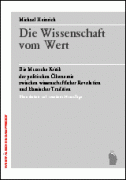Die Wissenschaft vom Wert

How to place Karl Marx in the history of economic thought? Last of the classical economists or first of the moderns? Neither one nor the other. Rather, Marx's critique of political economy represents an unfinished scientific revolution. Marx's theory of value opens up a new theoretical field. It not only breaks with the substantialist doctrine of Smith and Ricardo, it also breaks with the non-monetary perspective of neoclassical theory. Only through the revelation of the intrinsically social and monetary nature of the value of commodities the products of labor become objects of value. Compared with Marx's scientific revolution, it becomes clear that classical and neoclassical economic theory constitute different paradigms which however belong to the same theoretical field. In some key passages Marx regresses to the theoretical terrain of the classics: the Marxian theory of value and capital thus constantly oscillates between scientific revolution and the old theoretical field. This oscillation causes some problems in Marx's exposition, and is also at the basis of somewhat contradictory interpretations. It is therefore not enough to interpret Marx, it is rather necessary to understand his scientific revolution to bring it to completion. The volume probably represents one of the most exhaustive presentation of Marx's economic theory and of the debate that surrounded it after that of Sweezy, representative of a traditional Marxism whose nature Heinrich disputes pre-monetary and the equilibrium paradigm, which were reproduced in another form in subsequent readings; just as the author refutes interpretations that read the theory of crisis in terms of a theory of collapse. It is a classic of critical literature, whose position in the contemporary debate is completely original and innovative.